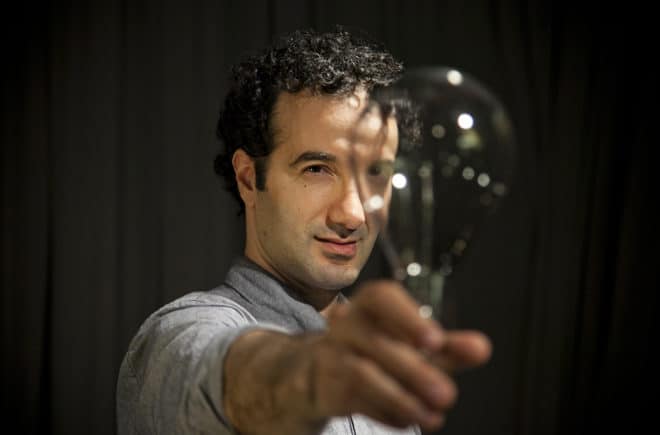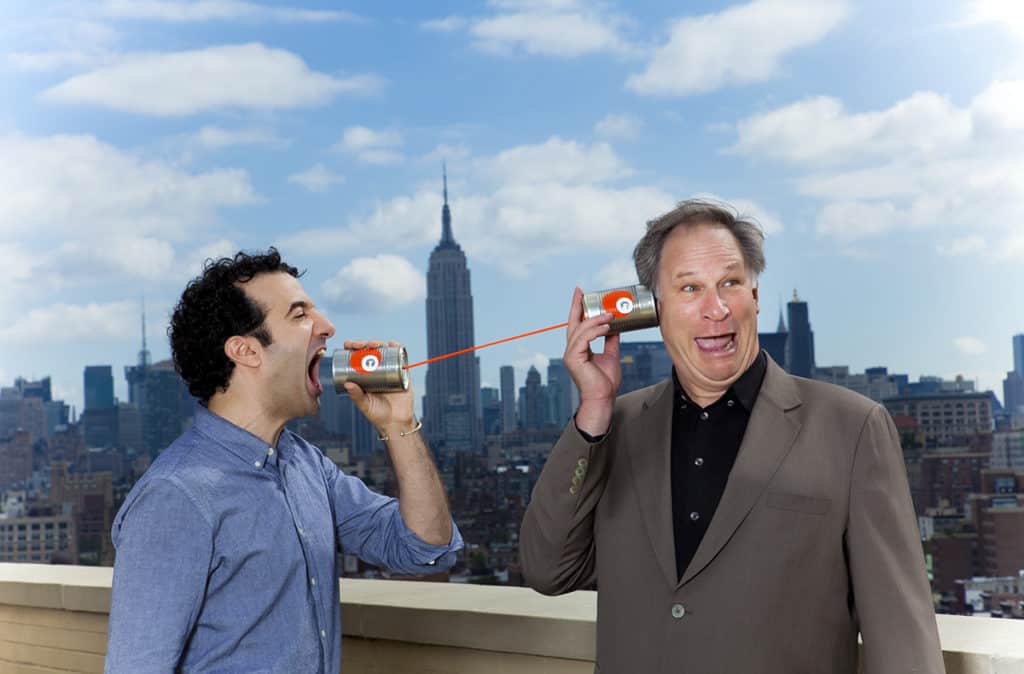The 14 Best Radiolab Podcasts

Last updated on February 16th, 2024
When it comes to sparking curiosity and instilling wonder, few podcasts are as consistent as WNYC’s Radiolab. Hosted by Jad Abumrad and Robert Krulwich, the nationally syndicated radio show and podcast has a cult-like following and has won numerous awards, including two Peabody’s. Radiolab podcasts combine traditional investigative journalism with innovative storytelling methods and stands out in the crowded field of science shows because of its masterful audio production. Radiolab episodes consistently push the limits of audio and bring in experimental and innovative techniques that make stories that much more engaging to listen to.
Although not serialized, Radiolab releases episodes in seasons of about 5 to 10 episodes each. Now in it’s 15th season, the show is widely acclaimed by both listeners and critics and averages about 1.8 million listeners per episode, according to The New York Times. Episodes are typically less than an hour in length (usually in the 30 mins range) and considered very accessible, despite their sometimes complicated scientific topics.
They are on a self described “curiosity bender.” Which has to be one of the coolest turns of phrase ever.
Table of Contents
The Best Radiolab Podcasts
Choosing the best Radiolab episodes is a daunting and ongoing task. So special thanks for bookmarking and checking back in every so often when we update the list or our recommendations.
You can also sign up for our newsletter to get these updates in your inbox
You can listen to Radiolab’s massive archive of episodes via WNYC Studios, as well as on iTunes and Stitcher.

CRISPR
June 6, 2015
Conversation around CRISPR is becoming increasingly more prevalent, but Radiolab was one of the first places to tackle the scientific concept of rewriting DNA with this humorous and deeply profound 2015 episode. After spending a bit of time explaining the topic in an approachable way, Abumrad and Krulwich spend a remainder of the show going in depth into some of the ways we may see CRISPR applied.
From bringing animals back from the dead and creating flying pigs to tweaking the genes of human embryos, the episode provides a deep look into how exactly CRISPR is already being used and how it may change the course of evolution in the future. Two years later, the episode was re-released with new updates on the topic and new interviews with some of the same experts that initially introduced Radiolab and thousands of listeners to CRISPR in 2015.
It makes you wonder what the dollar value on rewriting DNA could be, doesn’t it? Will this end up being one of those tools that advances society itself, or will it remain in the domain of the wealthy? Time will tell.
The Gatekeeper
Jul 15, 2022
It is pretty safe to say that we are in some muddy legal water when it comes to just about every social and technology issue our country is facing. A lot of those issues are sorted out via law suit, and in the Supreme Court. A lot of those issues also revolve around science of some kind. Be it the medical ramifications of abortion to the technology behind free speech and the Internet, you have to admit science plays a big role.
So who made the Supreme Court (without a scientist, or anything close to a scientist among them) the arbiters of what is good science that can be presented in arguments?
Well, that’s where Peter Smith and Matt Kielty (who is also in charge of the innovative sound design) come in. They explore the legal history behind the Supreme Court acting as a scientific gatekeeper between interests and the American public at large. It’s one of the best Radiolab episodes if for no other reason it’s more relevant in 2023 and beyond than when it was recorded.
The Humpback and the Killer
July 29, 2022
Killer whales are fascinating. First of all, they are misnamed. They were whale killers, because those sailing the high seas would see these massive dolphins decimating a whale or two. These orcas really are apex predators.
Even Great White Sharks are terrified of them and will give them a wide birth lest they lose their liver. Yeah, these largest of dolphins will eat only the liver of a white shark, and leave the rest. Crazy stuff.
They also eat humpback whale calves. Easily. And here we come to what makes this Radiolab episode so interesting. Scientists discovered mature humpback whales will go out of their way to keep orcas from eating, seals, and other species.
That’s not something you often see, which is what makes this 35 minute Radiolab tale so interesting. Different species protecting, deliberately, other species.
Diagnosis
December 29, 2008
If you’re looking for stories to share at dinner parties that may make you look smarter, there is no denying that Radiolab is a great place to start. It’s one of the few podcasts asking the deep questions. In this episode, multiple stories are shared about humans solving problems, based on the idea that humans might not always know what’s right.
Several stories touch on medicine, starting with a look into how doctors worked to try to understand pancreatic cancer, and ending with a mindblowing 10-minute story about why doctors once irradiated the throats of thousands of children. There are also stories about technology, psychology and human behavior and the episode is a bit like reading or hearing stories from Freakonomics for the first time, full of unexpected twists and new facts to share.
Corpse Demon
April 2023
In the West we tend to think of religion in terms of the big three of monotheism. Christianity, Islam, and Judaism are the heavy hitters and influencers. Right? Well, when it comes to some of the most common and shared ideas, you really need to go back to the ancient Persian monotheistic religion Zoroastrianism.
In the episode Corpse Demon, the show explores the post mortem practice of placing the dead on a high pillar to let vultures clean the corpse. Sounds morbid, but in an ancient world without modern medicine or modern hygiene products, it’s a pretty sanitary way to handle the situation.
But what happens when the vultures disappear and the corpses are left to rot? Well, nothing good. Any given episode in This American Life is going to take a left turn at some point, and moving from the religious practices of one of the oldest known religions to the health of the vulture community is that turn.
It’s a fascinating 30 minutes on the human experience.
Colors
May 21, 2012
Equal parts science and poetry, this episode focuses on the concept of color and considers it from numerous angles. From the obvious but unasked (Why is the sky blue?) to the deeper and more unusual (What did Sir Isaac Newton want to learn by sticking a knife in his own eye?), “Colors” truly takes on color in a way that few other journalists have.
What is so profound about this episode is that while it is a scientific take on color, it is presented more like a narrative with stories rather than lectures. For example, in a segment that stems from the commonly-known fact that dogs see colors differently than humans, Abumrad and Krulwich take on the story of a sea creature that sees color even more different than humans. They also touch on color blind monkeys, who see color not unlike many human males. While deeply informative, it is also an episode meant to spark questions and wonder, which is what Radiolab does best.
Sleep
May 24th, 2007
Thought you knew everything there was to know about sleep? Think again. This early episode goes deeper into the concept of sleep than anyone ever though they needed to go with a series of interviews with scientists, professors and specialists on the topic.
The best part of this episode is the ultimate realization that scientists really know very little about why we need sleep and why we behave how we do while in bed. The episode also shares fun stories about how iguanas literally sleep with one eye open and what rats dream about, ultimately relating it all back to us, our brains and what animals can teach us about human behavior.
Cities
October 8, 2010
In this episode, Radiolab takes to the streets and investigates how exactly cities work, from large-scale aspects that we often overlook to tiny details that are equally unnoticed. The episode is a mix of more serious, factual research into what makes cities work and some of the similarities between the world’s biggest cities, and smaller anecdotes and oddities about cities. One story for example is that of Centralia, a now tiny town in Pennsylvania that has had a coal mine fire burning underneath it for over fifty years.
The episode also has a personal touch to it, with conversations with city-dwellers that help explain cities just as well as the conversations with physicists do. You’ll also get a great example of Radiolab’s elaborately stylized production, with a precise, atonal soundtrack of city tones and backing the entire hour-long show.
Falling
September 20, 2010
Radiolab is mostly an educational listen, but it can also be a very funny one. In this episode, the theme is “falling” in all aspects of the word, from love, to injury, to Niagara. In one story, a motorcyclist reflects on a crash in which he says he composed a song in his head based on the thumps his helmet made against the ground as he crashed down. There is also a story about falling in love, and some of the science behind the feelings involved.
In the segment about Niagara Falls, the main focus is the act of riding down the falls in a barrel, including the story of Annie Taylor, the first person to survive a trip over the falls. It’s an odd story about why a schoolteacher decided to take a train to Niagara in 1901 with a custom-made barrel, and how exactly she survived.
Blame
September 12, 2013
Three stories are presented on the topic of blame, both the moral aspects of it and new technology that can help us understand the concept more deeply. “Blame” brings all the best aspects of Radiolab by sharing stories that are thought-provoking and driven by emotion.
There are several big takeaways from this episode, but perhaps the most important come from the discussion around understanding felons. This concept comes to a climax during the final story, where a guest reporter Bianca Giaever shares a story about the relationship between a man and the murderer of his daughter. The story is deeply personal about the two men and how they have both come to understand the crime, but also an enlightening take on how we can approach blame and forgiveness.
60 Words
April 18, 2014
Radiolab rarely takes on politics, and when it does the stories are more behavioral than partisan. This is one of the best examples of that, where the hosts analyze a sentence that was written shortly after September 11th, 2001 and became the legal foundation for the “war on terror.” In collaboration with Buzzfeed reporter Gregory Johnsen, the story looks word by word at the confusing yet incredibly important sixty-world Authorization for Use of Military Force (AUMF) and what it meant for U.S. politics.
During the episode, interviews with journalists, legal experts and politicians help understand how the sentence was interpreted, why it is so impactful, and how it will affect the future of war and peace.
Cut and Run
November 1, 2013
Fans of running might be familiar with the Kalenjin people, an ethnolinguistic group indigenous to Kenya that has produced an astonishing number of champion long-distance runners. In this episode, Radiolab works to investigate a number of factors that may be responsible for this trend, from simple economics to unusual cornmeal to an usually high tolerance to pain.
There are interviews with scientists, reporters and Kalenjin runners themselves, ultimately leading to a great episode of Radiolab that provides a deep look at a seriously interesting question.

Photo credit: MarcoAntonio.com
Adoptive Couple v. Baby Girl
May 30, 2013
Abumrad introduces this episode as the story of “a little girl who became a very, very big deal,” and he’s right. The episode begins as a very simple story of a pregnant woman named Christy Maldonado who put her baby up for adoption, but when the legal system gets involved it becomes a complicated case involving a decades old law called the Indian Child Welfare Act. Years of litigation led to a showdown in the Supreme Court and ultimately a massive ethical and legal dilemma.
Fans of this episode should also listen to Radiolab’s spin-off series More Perfect, which looks at how Supreme Court decisions affect daily life. Episodes are available at wnycstudios.com.
23 Weeks 6 Days
April 30, 2013
While many episodes of Radiolab focus on big, profound topics like fear, words, or outer space, there are also a number that focus on one very personal, individual story. In “23 Weeks 6 Days,” the entire hour of radio is dedicated to Kelley Benham, her husband Tom French and Juniper, their daughter who was at 23 weeks and 6 days, roughly halfway to full term. The story is astonishingly intimate, but also contains an additional layer of questions about life and death, what it means to “do no harm,” and how technology fits into human life.
Breaking News
July 27, 2017
In an episode inspired by the 2016 election and the idea of fake news, Radiolab gets a firsthand look at a a new technology created by Adobe that can result in manufactured videos where faces and voices are contorted to say words they never said. Adobe Voco, the software in question, has been called “Photoshop for voice” and in the episode is considered from both technical and business perspectives, and ethical and security ones.
At the end of the episode, Abumrad, Krulwich and producer Simon Adler put the software to the test and find the software to be both surprisingly useful and slightly terrifying. Listeners will agree, and will also find the episode especially useful as Voco and similar softwares are starting to be used for videos and audio appearing online.
Straight Out Of Chevy Chase
April 1, 2014
Abumrad and Krulwich don’t claim to be experts on hip hop or even moderately knowledgeable about it, but in this episode they explore various aspects of the genre and what makes it so unique.
A large portion of the episode revolves around an interview with Peter Rosenberg, a DJ at New York City’s iconic hip-hop station Hot 97, who helps explain the trends of hip hop and what makes some stick and others disappear. Built on authenticity and realness, the discussion of the fine line in hip hop between commercial success and becoming watered down “pop music” is worth a listen for hip hop fans and those less into the genre alike. For slightly lighter listening, Rosenberg also touches on his fued with Nicki Minaj and how he thinks he, a Jewish kid from Maryland, managed to become an influential voice in hip hop.
Patient Zero
November 14, 2011
An episode that focuses on the idea of the people at the heart of an outbreak, “Patient Zero” is a deeply fascinating look at people and stories both well documented (Typhoid Mary) and not (the root of AIDS).
While much of this episode is deeply serious and focuses on some of the deadliest pandemics in history, there is also a bit of humor as Abumrad and Krulwich reflect on how disease may have spread through cowboy hats during the 1865 Colorado Gold Rush. The episode has science, but it also has mystery, ultimately proving that the issue with patient zero’s is that we don’t know they’re going to be patient zero until it is too late.
Frequently Asked Questions
Did Radiolab change hosts?
Yes, Radiolab changed hosts in 2022. The takeover was announced back in 2020, but the pandemic slowed down the move. Lulu Miller and Latif Nasser took over the long running show in 2022. The podcast world was all a buzz with the news, but we here at DiscoverPods continue to think the show is producing some of the best work in the space.
Where can I listen to old Radiolab?
Apple Podcasts and Spotify both have an extensive archive of the best Radiolab episodes. The Radiolab website also has a a good deal of episodes that can be listened to through your browser. Not exactly the best option for those of us on the move, but it gets the job done.
Does Radiolab still Exist?
Radiolab does still exist. We updated this list to add an episode from April 2023. The show has gone through some changes in it’s 15 seasons, but some of the best Radiolab episodes are still being recorded, edited, and shared with the public today.
Conclusion
Picking just a few of the best Radiolab episodes isn’t an easy task. They have been in production for more than 20 years, and it’s hard to find an objectively “bad” episode. The podcast format is almost always perfect. Not too long to turn listeners off, but long enough to make the most complex ideas accessible.
That’s not easy to do. They rarely run an hour-long episode, even when the topic is obscenely complex.
It also remains a show that is true to the audio format. The way the shows are made don’t lend themselves well to the video format or a YouTube channel. Not that there’s anything wrong with video, and it may be the trending format, but staying true to the audio first policy is refreshing here at DiscoverPods.
If you aren’t listening to Radiolab, you need to start today. We’ll continue to update this post to ensure that the best Radiolab episodes are featured front and center. So keep checking back.













Comments
Comments are closed.